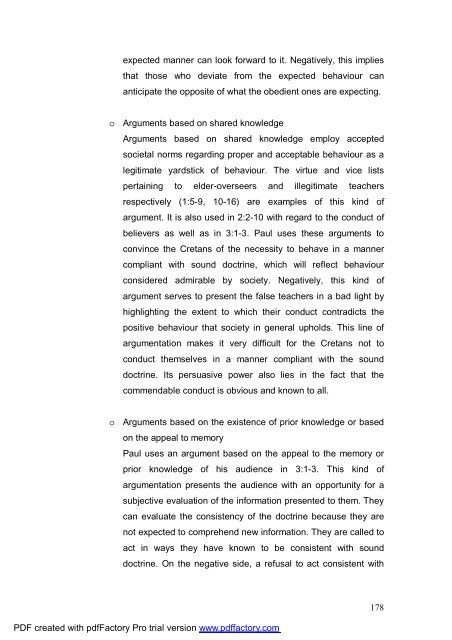A Text centred rhetorical analysis of Paul's Letter to Titus
A Text centred rhetorical analysis of Paul's Letter to Titus
A Text centred rhetorical analysis of Paul's Letter to Titus
You also want an ePaper? Increase the reach of your titles
YUMPU automatically turns print PDFs into web optimized ePapers that Google loves.
expected manner can look forward <strong>to</strong> it. Negatively, this implies<br />
that those who deviate from the expected behaviour can<br />
anticipate the opposite <strong>of</strong> what the obedient ones are expecting.<br />
o Arguments based on shared knowledge<br />
Arguments based on shared knowledge employ accepted<br />
societal norms regarding proper and acceptable behaviour as a<br />
legitimate yardstick <strong>of</strong> behaviour. The virtue and vice lists<br />
pertaining <strong>to</strong> elder-overseers and illegitimate teachers<br />
respectively (1:5-9, 10-16) are examples <strong>of</strong> this kind <strong>of</strong><br />
argument. It is also used in 2:2-10 with regard <strong>to</strong> the conduct <strong>of</strong><br />
believers as well as in 3:1-3. Paul uses these arguments <strong>to</strong><br />
convince the Cretans <strong>of</strong> the necessity <strong>to</strong> behave in a manner<br />
compliant with sound doctrine, which will reflect behaviour<br />
considered admirable by society. Negatively, this kind <strong>of</strong><br />
argument serves <strong>to</strong> present the false teachers in a bad light by<br />
highlighting the extent <strong>to</strong> which their conduct contradicts the<br />
positive behaviour that society in general upholds. This line <strong>of</strong><br />
argumentation makes it very difficult for the Cretans not <strong>to</strong><br />
conduct themselves in a manner compliant with the sound<br />
doctrine. Its persuasive power also lies in the fact that the<br />
commendable conduct is obvious and known <strong>to</strong> all.<br />
o Arguments based on the existence <strong>of</strong> prior knowledge or based<br />
on the appeal <strong>to</strong> memory<br />
Paul uses an argument based on the appeal <strong>to</strong> the memory or<br />
prior knowledge <strong>of</strong> his audience in 3:1-3. This kind <strong>of</strong><br />
argumentation presents the audience with an opportunity for a<br />
subjective evaluation <strong>of</strong> the information presented <strong>to</strong> them. They<br />
can evaluate the consistency <strong>of</strong> the doctrine because they are<br />
not expected <strong>to</strong> comprehend new information. They are called <strong>to</strong><br />
act in ways they have known <strong>to</strong> be consistent with sound<br />
doctrine. On the negative side, a refusal <strong>to</strong> act consistent with<br />
PDF created with pdfFac<strong>to</strong>ry Pro trial version www.pdffac<strong>to</strong>ry.com<br />
178

















